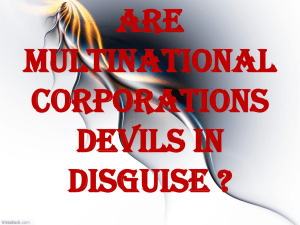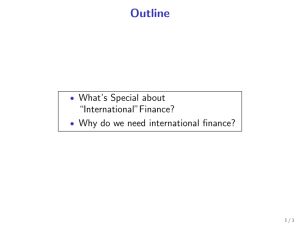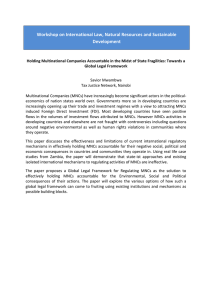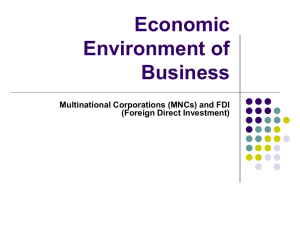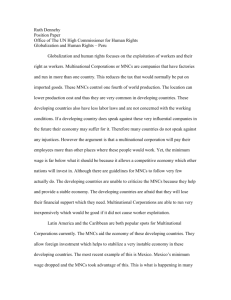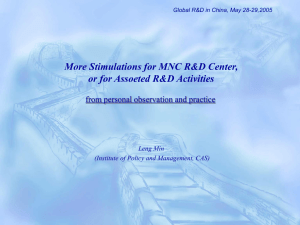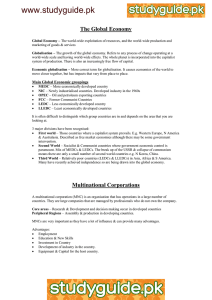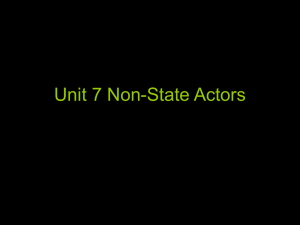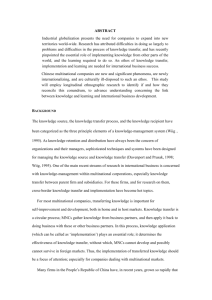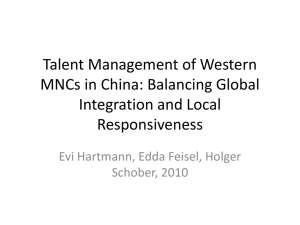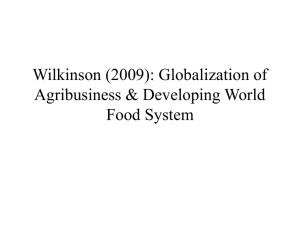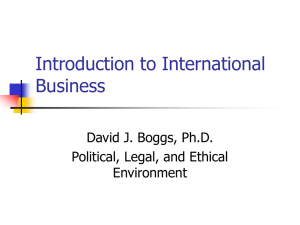Global-Trust
advertisement
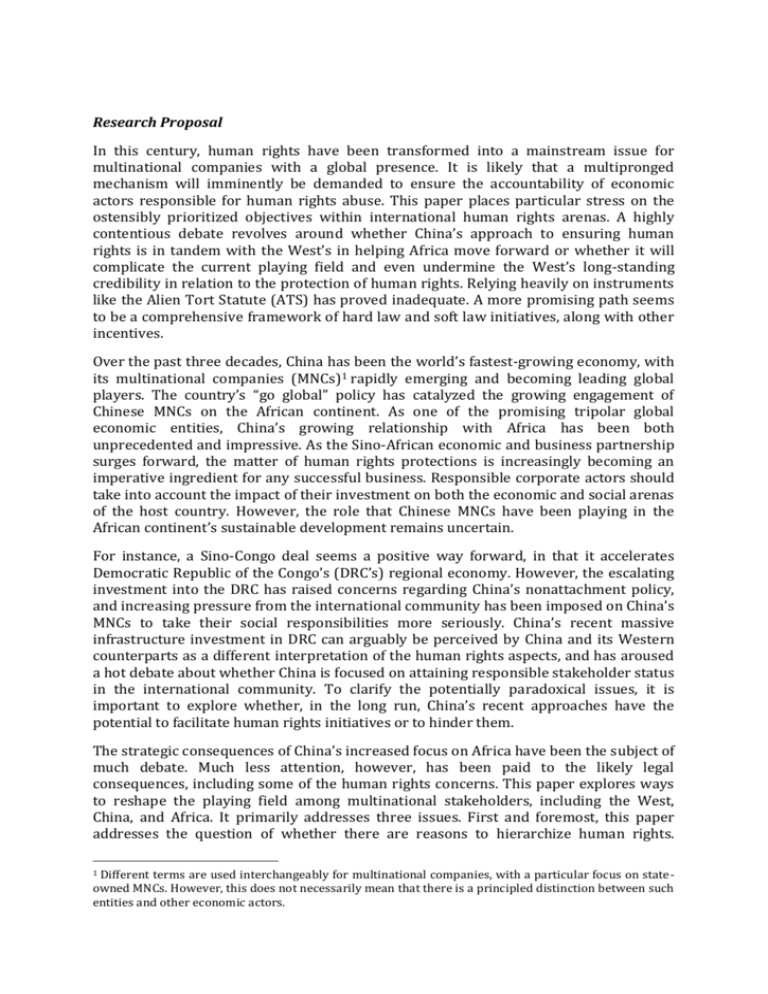
Research Proposal In this century, human rights have been transformed into a mainstream issue for multinational companies with a global presence. It is likely that a multipronged mechanism will imminently be demanded to ensure the accountability of economic actors responsible for human rights abuse. This paper places particular stress on the ostensibly prioritized objectives within international human rights arenas. A highly contentious debate revolves around whether China’s approach to ensuring human rights is in tandem with the West’s in helping Africa move forward or whether it will complicate the current playing field and even undermine the West’s long-standing credibility in relation to the protection of human rights. Relying heavily on instruments like the Alien Tort Statute (ATS) has proved inadequate. A more promising path seems to be a comprehensive framework of hard law and soft law initiatives, along with other incentives. Over the past three decades, China has been the world’s fastest-growing economy, with its multinational companies (MNCs)1 rapidly emerging and becoming leading global players. The country’s “go global” policy has catalyzed the growing engagement of Chinese MNCs on the African continent. As one of the promising tripolar global economic entities, China’s growing relationship with Africa has been both unprecedented and impressive. As the Sino-African economic and business partnership surges forward, the matter of human rights protections is increasingly becoming an imperative ingredient for any successful business. Responsible corporate actors should take into account the impact of their investment on both the economic and social arenas of the host country. However, the role that Chinese MNCs have been playing in the African continent’s sustainable development remains uncertain. For instance, a Sino-Congo deal seems a positive way forward, in that it accelerates Democratic Republic of the Congo’s (DRC’s) regional economy. However, the escalating investment into the DRC has raised concerns regarding China’s nonattachment policy, and increasing pressure from the international community has been imposed on China’s MNCs to take their social responsibilities more seriously. China’s recent massive infrastructure investment in DRC can arguably be perceived by China and its Western counterparts as a different interpretation of the human rights aspects, and has aroused a hot debate about whether China is focused on attaining responsible stakeholder status in the international community. To clarify the potentially paradoxical issues, it is important to explore whether, in the long run, China’s recent approaches have the potential to facilitate human rights initiatives or to hinder them. The strategic consequences of China’s increased focus on Africa have been the subject of much debate. Much less attention, however, has been paid to the likely legal consequences, including some of the human rights concerns. This paper explores ways to reshape the playing field among multinational stakeholders, including the West, China, and Africa. It primarily addresses three issues. First and foremost, this paper addresses the question of whether there are reasons to hierarchize human rights. Different terms are used interchangeably for multinational companies, with a particular focus on stateowned MNCs. However, this does not necessarily mean that there is a principled distinction between such entities and other economic actors. 1 Hierarchizing human rights arguably would justify China’s approach of prioritizing certain development objectives over others. Second, this paper offers a critical challenge to the widely held, but mostly controversial, view that under the ATS, corporations may not be liable for their violations. The assessment presented in this paper is based on the uniqueness of the arm’s-length activities of Chinese state-owned MNCs,2 which in substance blur the traditional divide between state and corporation. Finally, a multipronged regulatory regime is explored for enhancing the protection of human rights. Section 2 of this paper establishes the context under which China’s projects are undertaken, with a primary focus on energy security, along with other economic and geopolitical strategies. China’s emergence as a significant world player on the economic scene and its need for oil and national resources have driven China to enter into increasingly contractual relations with resource-rich countries. This strategy enables China not only to diversify its substantial reserves of foreign currency and help the Communist Party maintain legitimacy in power, but also to boost its African portfolio as a whole. Section 3 moves to current human rights theories and some cutting-edge practices of how to deal with human rights abuses, highlighting, in particular, the landmark case of the Sino-Congo deal. This section also examines whether it is possible for the Western and Chinese models of foreign aid to exist in tandem. Section 4 considers feasible remedial regimes for victims of human rights abuses and enforcement systems at both the international and domestic levels. The implications of Kiobel v. Royal Dutch Petroleum are important to consider. The U.S. Supreme Court’s decision to rehear arguments in the landmark case indicates the split of the circuit courts and the limits of ATS, with a particular regard to the ATS’ unstable forum for adjudicating civil liability for gross human rights violations committed abroad. A remaining issue is whether China should be liable for its state-owned or state-controlled MNCs, in view of their status as quasi-state actors. The question of how a more effective governance regime can be established seems indispensable from a legal perspective. Section 5 examines a tripolar regulatory framework that aims at striking a balance between mandatory and voluntary enforcements. Emphasis is put on how international soft law initiatives, such as John Ruggie’s “Protect, Respect, and Remedy” framework, are transposed within domestic legal systems, especially when national law does not function as presumed by those international norms. The conclusion includes some innovative proposals for facilitating China’s legal response to the cutting-edge challenges that arise from the overseas behavior of its MNCs. It is vital to strike a balance between private and public enforcement of human rights laws to hold those MNCs to account for their involvement in human rights abuse. Meanwhile, it may make more sense to integrate the well-established international soft law initiatives into Chinese domestic legal regimes. Andrew Szamosszegi and Cole Kyle, “An Analysis of State‐owned Enterprises and State Capitalism in China” (Washington DC , U.S.-China Economic and Security Review Commission, October 26, 2011), http://www.uscc.gov/researchpapers/2011/10_26_11_CapitalTradeSOEStudy.pdf. 2
